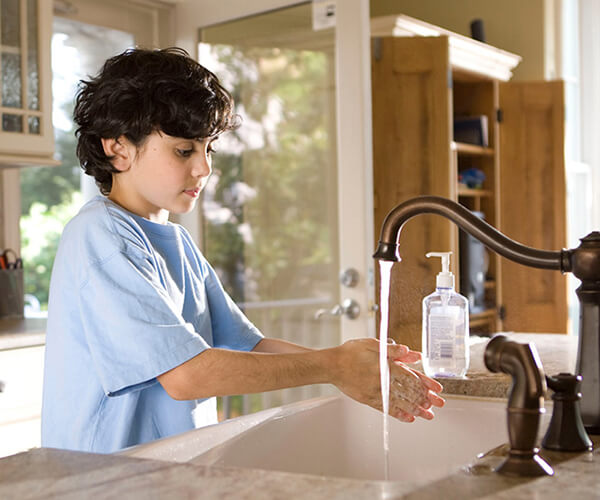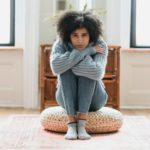
Coronavirus has turned the world on its heel, sent stockpiling through the roof, stocks through the floor and spiked anxiety in ways that will impact health and wellbeing over many months, maybe years. I get it. It’s easy to worry and become anxious when there’s a grim news update every hour, maps of the virus show affected countries (and always, it seems, in the colour red) and there’s talk of cancellations of mass gatherings and grounding of aircraft.
It’s also a reminder and anxiety trigger when we see that other people are taking precautions like stocking up on toilet paper, flour and hand sanitiser. Even if we’re not locked down for weeks, none of us want to start looking for old copies of the Yellow Pages to restock supplies in our bathrooms. I’m intrigued about the toilet paper and the flour, is everyone suddenly planning on baking?
The stocking up of household items is one of the very few ways we can feel like we’re taking control of our situation. Anxiety stems from fear and uncertainty. It’s the reaction of our body and brain to an anticipated threat. It’s perfectly natural to feel anxious under the circumstances, but it’s also vital that we do all we can to manage our anxiety so we can continue to move forward with our lives and avoid causing more anxiety among the people around us, especially our kids.
The contagion of anxiety is detrimental to our health and wellbeing. Let’s take a moment to familiarise ourselves with trusted information that will support us to take the best care of our mental and physical health.
Here’s the good news:
- Most people with COVID19 experience mild illness
- The highest risk group are people 80 years+
- The fatality rate was 0.2% in people 10-39 and 0.4% in 40 somethings
- The mortality rate is around 2% overall and will drop as more people with a mild case of the illness are diagnosed
- more than 100 clinical trials are currently under way to test new and repurposed drugs to treat people with COVID-19
- We can actively reduce our risk by using hand sanitiser and washing our hands with soap and water
- The least affected among us are children
- The Coronavirus cannot be transmitted via goods manufactured in China or any country reporting cases
- The rapid progress that science and public health have made in confronting the COVID-19 outbreak is unparalleled
- The virus cannot be transmitted through mosquito bites
- Our kids know what to do when it comes to washing their hands, we’ve been telling them forever! That said….they would all benefit from a recap on proper hand washing and the use of hand sanitisers
What symptoms should we look out for?
A review study on COVID-19 was published in the Journal of the American Medical Association reported that 83% to 98% of patients develop a fever, hence the reason a temperature check has become common place when determining if a person might have the virus. A dry cough is developed by 76% top 82% while 11% to 44% become fatigued. Other less common symptoms include muscle aches, headache, sore throat, abdominal pain and diarrhoea.
What do I do if I have symptoms? GP or hospital? Self-isolation? What do I do if my child or one of my parents or grandparents become unwell?
Calla Wahlquist wrote a well-researched and comprehensive article in The Guardian on March 9th answering all of these questions and more. She includes Health Department numbers for each state, links to Government health advice and directs readers to trusted resources.
Coronavirus health information hotline
1800 020 080
Handling fear and uncertainty
Dr Deborah Gilboa has some sensible suggestions when it comes to handling fear and uncertainty. She says denial and ignoring doesn’t work and that anger or freezing up from overwhelm are understandable but not useful. She suggests the following strategies for yourself, your teams, and with kids:
- What do you already (think you) know about this? Now fact check it. Feelings and other peoples’ fears are not facts
- What do you need to know to protect yourself? Now go learn accurate, up to date info from a trustworthy source. For Coronavirus, Dr. Gilboa recommend the CDC Situation Summary because it’s updated regularly and fact-based. You can also check the Australian Government’s Department of Health update and the World Health Organisation’s Coronavirus (COVID-19) outbreak website.
- What can you control? In any scary situation there are actions and behaviours you can DO and that helps kids and adults stop ignoring the danger and focus on what is possible.
- How can you handle your fear? The most important practice of all – what are your coping mechanisms when you’re scared? Who can you connect with, what activities or distractions give the worry part of your brain a break?
- Look at coronavirus head-on, don’t be afraid to address it. That will keep you safer AND make you stronger.
Isolation
If you are tested for COVID-19 and need to spend some time in quarantine, take the time to do some of the activities you might not normally have time for. Spending your days watching Netflix, though tempting, isn’t going to do much for your mood and wellbeing in the long run. Neither is watching too much news. Think about the books you’ve been busting to read, or perhaps an online course you’ve never quite had the time for. And make sure you stay in contact with the ‘outside world’. Technology makes this easy for us.
Advice from our Federal Health Minister
If you have been exposed or believe you’ve had exposure to COVID-19, Federal Health Minister Greg Hunt recommends self-isolation and getting yourself tested, preferring people to ‘over-test’ than ‘under-test’.
What do I tell my kids?
It’s a new era for all of us and it’s going to be an issue for our communities and our country for some time. Keep informed, take sensible precautions and share age appropriate information with your children.
Children can struggle to get perspective on what’s happening in the world and how that might impact upon them. They can hear other kids talking about news snippets in the playground and can often arrive at worrying conclusions. It’s always best to start where children are at, so begin by asking them what they’ve heard and help settle their concerns with accurate information that is relevant to their world. If you’re glued to live updates or watching the 24 hour news cycle, that’s perfectly fine, although not particularly good for your own mental health; just make sure that your children aren’t exposed to more information than is necessary.
Take care and remember, we’re all in this together and tough times do pass.
Jodi x
This blog provides general information and discussions about health and related subjects. The information and other content provided in this blog, or in any linked materials, are not intended and should not be construed as medical advice, nor is the information a substitute for professional medical expertise or treatment.
If you or any other person has a medical concern, you should consult with your health care provider or seek other professional medical treatment. Never disregard professional medical advice or delay in seeking it because of something that have read on this blog or in any linked materials. If you think you may have a medical emergency, call your doctor or emergency services immediately.


about
Jodi is on a mission to elevate mental health and wellbeing in families, classrooms and workplaces.


free 5-day
Calm your anxious brain
mini course

Recent Posts

free 5-day
Calm your anxious brain
mini course
Sign up for my free 5-day ‘Calm Your Anxious Brain’ email mini-course. Put the strategies into place for yourself, light the way for your kids, or do both.






